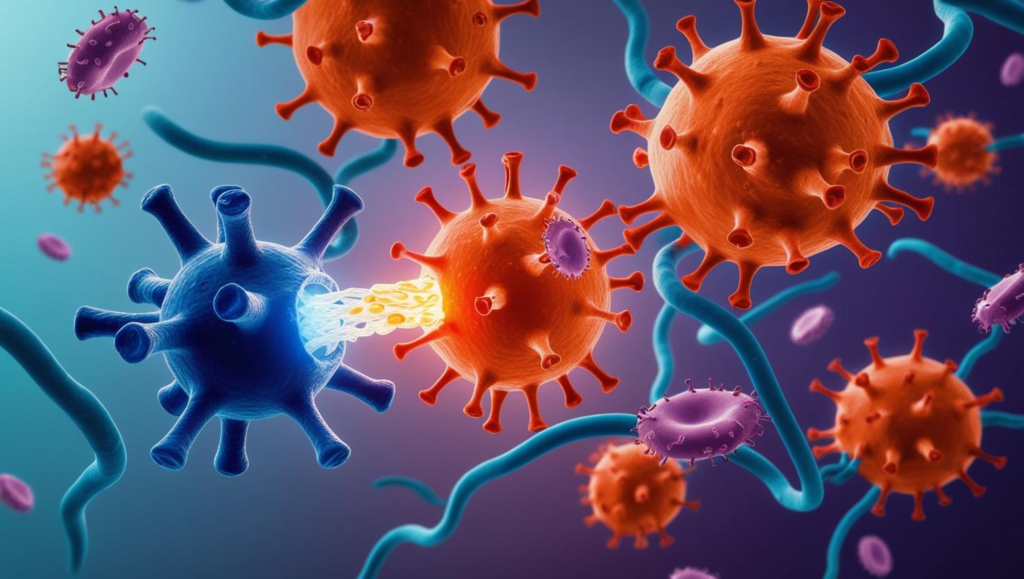
Imagine your body as a fortress, guarded by billions of tiny soldiers and security systems, all working together to keep you safe. The key players in this drama? Antigens and antibodies.
What’s an Antigen?
An antigen is like a little flag post on the surface of cells, waving a message to the immune system. This flag says, “Hey, here’s who I am!”
- Your Own Cells: They wave friendly flags, saying, “I belong here. Don’t attack me!”
- Intruders (like viruses or bacteria): Their flags scream, “I’m a troublemaker!” These are foreign antigens, and your immune system is trained to detect and destroy them.
Each antigen has a unique shape, like a puzzle piece or a secret handshake. If the immune system doesn’t recognize it as “one of us,” alarms go off, and the body springs into action.
Enter the Antibodies
Antibodies are the defenders your body builds to fight off invaders. Think of them as tiny soldiers, custom-made for each specific antigen.
- Special Forces: Antibodies are precision tools—they’re designed to fit perfectly with a matching antigen, like a key in a lock. Once they latch on, they mark the intruder for destruction or neutralize it outright.
- Rapid Builders: When an intruder is detected, your immune system goes into overdrive, creating a ton of antibodies specific to that invader. It’s like building an army of snipers who know exactly what to aim for.
How It All Works Together
- Spot the Intruder: A foreign cell with unfamiliar flag posts (antigens) sneaks in.
- Raise the Alarm: Your immune system says, “Whoa, you don’t belong here!”
- Call in the Soldiers: Your immune system builds antibodies designed to latch onto those specific antigens.
- Neutralize or Destroy: Once the antibodies attach to the antigens, it’s game over for the invader—your body’s immune cells come in to clean up the mess.
Vaccines and the Role of Antibodies
Vaccines like Tdap are genius because they train your immune system. They introduce harmless pieces of the bad guy’s flag posts (antigens) into your body. This allows your immune system to learn what the intruder looks like without facing the real danger.
- Practice Makes Perfect: Your body builds antibodies ahead of time, so if the real thing shows up, it’s ready to fight back instantly.
- Memory Cells: Some immune cells become long-term “memory keepers,” so your body can respond even faster in the future.
Pretty cool, because:
Your immune system is like a high-tech security system combined with a rapid-response SWAT team. Antigens are the suspicious ID tags, and antibodies are the sharpshooters designed specifically to take those intruders down. It’s as if your body has its own custom-built defense force, always ready to yell, “Not on my watch!”
So, the next time you hear about antigens and antibodies, just picture a battle of round cells carrying flags and an army of soldiers suiting up for action—it’s biology’s epic action movie, starring you!
The Cocoon of Care: Wrapping Your Baby in Protection

Imagine your newborn as a delicate little caterpillar—soft, precious, and not quite ready to face the world’s harsh realities. What does every caterpillar need to grow strong and safe? A cocoon, of course! In the world of vaccines, the cocoon of care is a protective shield created by vaccinating the people closest to your baby.
How It Works
Newborns are amazing, but their immune systems? Not so much. In the first few months of life, they’re still building their defenses and can’t handle certain vaccines yet (like the one for whooping cough). That’s where the cocoon comes in.
- You’re the First Layer: When you get vaccinated during pregnancy (like the Tdap vaccine), you pass antibodies to your baby, giving them some built-in protection. Think of it as weaving the first threads of their cocoon.
- Family and Caregivers Add More Layers: When everyone who spends time around your baby—partners, siblings, grandparents, babysitters—gets vaccinated, they form a protective bubble. This reduces the chance of someone accidentally bringing a dangerous illness into your baby’s space.
- Herd Immunity Completes the Cocoon: When your wider community gets vaccinated, it reduces the spread of diseases even further. Fewer germs circulating = a safer world for your little one.
Why It Matters
Some illnesses, like whooping cough, can be devastating for babies. In fact, 80% of infants who catch whooping cough get it from someone in their own household. By vaccinating yourself and your family, you create a barrier that keeps those germs far away.
Think of It This Way
A cocoon isn’t just about wrapping one layer around your baby—it’s about weaving a web of protection made up of everyone who loves them. Your shot, plus theirs, equals a snug, germ-fighting blanket your baby can rely on until their immune system is ready to tackle the world.
It’s not just science; it’s teamwork. And there’s no better team than the one cheering on your baby’s first wobbly steps, sleepy smiles, and cu

2 Responses